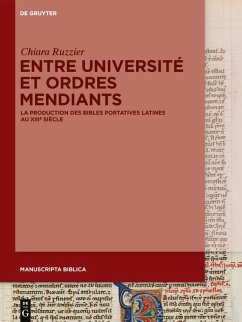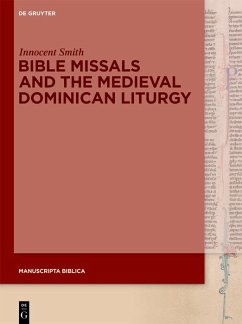
The Gospel of Saint Luke in West-Saxon (eBook, ePUB)
Enriched edition. A Journey Through Gospel Narratives in Old English
Kommentar: Callahan, Ivy / Redaktion: Good Press
Versandkostenfrei!
Sofort per Download lieferbar
1,99 €
inkl. MwSt.
Weitere Ausgaben:

PAYBACK Punkte
0 °P sammeln!
The Gospel of Saint Luke in West-Saxon is a remarkable adaptation of the biblical Gospel that introduces readers to the life and teachings of Jesus Christ through the lens of Old English. Written in a style that blends poetic cadence with prose clarity, this translation is marked by an insightful use of vernacular that makes the sacred text accessible to the West-Saxon audience of the time. The Gospel is characterized by its emphasis on compassion, parables, and the role of women, reflecting the theological concerns present in early medieval Christianity and its resonance with a culture steepe...
The Gospel of Saint Luke in West-Saxon is a remarkable adaptation of the biblical Gospel that introduces readers to the life and teachings of Jesus Christ through the lens of Old English. Written in a style that blends poetic cadence with prose clarity, this translation is marked by an insightful use of vernacular that makes the sacred text accessible to the West-Saxon audience of the time. The Gospel is characterized by its emphasis on compassion, parables, and the role of women, reflecting the theological concerns present in early medieval Christianity and its resonance with a culture steeped in oral storytelling traditions. Luke the Evangelist, traditionally regarded as the author, is not only a prominent biblical figure but also known for his background as a physician and companion to Paul the Apostle. This dual profession fuels his unique perspective, profoundly emphasizing the healing works of Christ and the notion of salvation for all, especially the marginalized. The manuscript reflects the historical milieu of 9th-century England, merging ecclesiastical concerns with the everyday lives of its readers, providing both spiritual and cultural insights. This innovative rendering of Luke's Gospel is highly recommended for scholars, students, and general readers interested in the intersection of faith and language during the age of the Anglo-Saxons. Its combination of theological depth and cultural relevance offers a rich exploration of the early Christian message, inviting contemporary audiences to engage with the text in a transformative manner. In this enriched edition, we have carefully created added value for your reading experience: - A succinct Introduction situates the work's timeless appeal and themes. - The Synopsis outlines the central plot, highlighting key developments without spoiling critical twists. - A detailed Historical Context immerses you in the era's events and influences that shaped the writing. - An Author Biography reveals milestones in the author's life, illuminating the personal insights behind the text. - A thorough Analysis dissects symbols, motifs, and character arcs to unearth underlying meanings. - Reflection questions prompt you to engage personally with the work's messages, connecting them to modern life. - Hand-picked Memorable Quotes shine a spotlight on moments of literary brilliance. - Interactive footnotes clarify unusual references, historical allusions, and archaic phrases for an effortless, more informed read.
Dieser Download kann aus rechtlichen Gründen nur mit Rechnungsadresse in A, B, BG, CY, CZ, D, DK, EW, E, FIN, F, GR, H, IRL, I, LT, L, LR, M, NL, PL, P, R, S, SLO, SK ausgeliefert werden.













